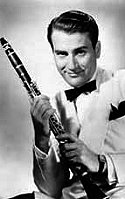
Sunday, 9th January, 2005
Just got back from Artie Shaw's funeral, which was held indoors in the
chapel of the Pierce Brothers Mortuary in Westlake Village because of
the pouring rain outside. Services were supposed to be public and held
at graveside, but because of the weather, guests were limited to family,
friends, press, and a few acquaintances (that's where I came in).
It was a nice service, filled with funny stories, "Artie-isms," and of course, music. The coffin was flanked by an early photo of Artie at the beginning of his career and a more recent picture of Artie in his library, looking either pensive or annoyed. Both of these pictures were included in the program. There was also the award presented by the NEA to Artie on Friday and a framed letter of congratulations from President Bush, dated November 30, 2004.
There was a succession of speakers at the service, which was led by Larry Rosen, Artie's longtime secretary. As he introduced each speaker, we got an impression of a man who was not a curmudgeon, but someone who was a Renaissance Man, a true genius, and a perfectionist, expecting no more than the same from people he knew. His motto: "Good enough is not good enough" sums up his sometimes abrasive personality and mindset.
Although there were many funny stories told, I couldn't commit all of them to memory, but here are a few highlights: The man whose job it was to catalog Artie's massive collection of over 10,000 books reported inscriptions in the front of three books in the library. One was by Albert Einstein, one by Sigmund Freud, and one by another famous author, whose name escapes me now. The handwritten inscription in the front of the Einstein book read: "To Artie Shaw, with profound admiration and respect." In the Freud book, the inscription read, "To Artie Shaw, with profound admiration and respect." Not only did the third book have the exact same words, but the cataloguer noticed that the handwriting was the same on all three. He asked Artie about it and Artie replied that he had written them himself, to identify the books in case they were ever stolen.
As we speak, Artie's book collection is still at his house. The shelves are reportedly completely full and stacks of books are on the floor and even piled on the stairs of his staircase.
Musician Tom Rainier chose to play two musical selections, which were played on Artie's own boom box that was brought to the chapel. One was a 1938 radio broadcast of Artie's hot big band playing a song that I believe was called "Everybody's Jumpin'." Artie wanted that played because it was five minutes long and gave the soloists a chance to spread out (Artie hated most of his studio sessions because of the restrictions in time). Artie took two choruses, another was by Georgie Auld, one by Tony Pastor and I couldn't identify the others.
The other song was the result of an interesting experiment in which Rainier took selected snippets of Artie's playing, reassembled them and inserted them into a new recording of Johnny Mandel's "The Shadow of Your Smile." The intent was to predict what Artie would sound like if he had continued to play after 1954. The result was actually pretty amazing.
Buddy DeFranco finished off the piece with an Artie-esque 8-bar cadenza that brought tumultuous applause throughout the chapel. Artie himself had admired the work and approved of it. Then Dick Johnson, leader of the Artie Shaw Orchestra for the past 20 years, played a poignant a cappella performance of "I'll Be Seeing You."
Eighty-five-year-old comedian Red Buttons talked about meeting Artie for the first time. "It was during the War," he remembered, "and we were both in uniform. Artie was in his Navy uniform and I was the bellhop at the Astor hotel." Buttons recalled that Shaw's first words upon meeting him were, "What kind of a name is 'Red Buttons'? Who in their right mind would give anyone that name?" To which Buttons reported that his real name was Aaron Schwat, to which Shaw immediately responded by calling Buttons "The Sultan of Schwat."
Sid Caesar was scheduled to be there and speak but he couldn't make it because of the rain. At that point, Larry asked if anyone else had anything to say about their relationship with Artie and there were a succession of very funny stories.
I told of my nerve-wracking first broadcast with him in 2000 and then my final meeting with him in 2003 to discuss Bix Beiderbecke's 100th birthday. Artie's admiration of Bix was not because of the notes Bix played or his technique, it was the sound he produced on his cornet. Artie rhapsodized about this sound and the fact that it could only have come from Bix. Above all, Artie admired the individual and hated when people said they tried to play like Artie did. "Play like yourself," he'd say.
When I asked him to comment on Eddie Condon's oft-heard description of Bix's sound, which was likening it to "a girl saying yes," Artie paused, shook his head and said, "Poor Eddie...He must have been pretty hard up."
The end of the service came after the playing
of Gershwin's "Someone to Watch Over Me" as sung by Lee Wiley,
Shaw's favorite singer. It was an unusual recording, recorded in 1939,
in which Wiley was accompanied by Fats Waller on pipe organ (Liberty Music
Shop L-282).
Cary Ginell Sound
Thinking Music
Source: René
Laanen